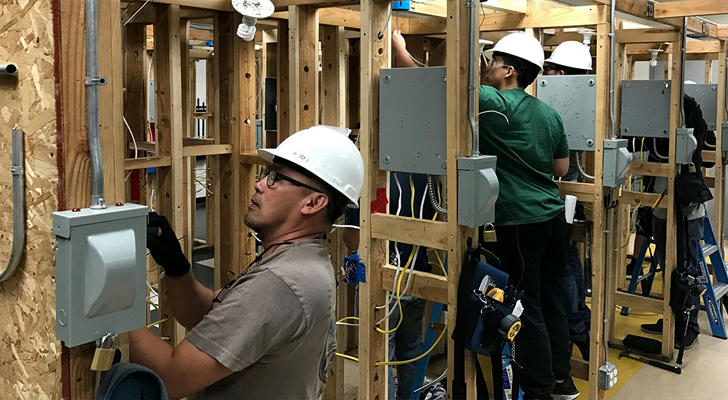Government-Supported Electrician Training: Learn While You Earn and Kickstart a Successful Career
The electrician industry is a stable and high-paying career field, and many people choose to enter this industry seeking training opportunities that allow them to earn an income while gaining practical experience. Fortunately, in the United States, the government provides various supportive electrician training programs. Many apprenticeship programs not only allow you to "learn while you earn," but also cater to applicants of all ages, ensuring that whether you're young or middle-aged, you can successfully enter and develop a career in the electrical field.

Why Choose Electrician Apprenticeship Training?
Electrician apprenticeship training offers an ideal career starting point, especially for those who do not plan to attend college or wish to change career paths. Government-supported electrician training programs can help you learn practical skills while earning an income. Through this training, you will not only gain hands-on experience but also enhance your skills, providing a solid foundation for higher pay and career growth.
Electrician Apprenticeship Training for All Age Groups
Young Adults (18-24) – A practical alternative to college, offering paid, hands-on training with wages starting at $15–$20 per hour.
Mid-Career Adults (30-50) – A great option for career changers, providing stable, well-paying opportunities with flexible entry.
Older Adults (50+) – Accessible programs with flexible conditions, allowing skill development and continued employment.

Benefits of Completing the Training
High-Paying Career
After completing the apprenticeship program, electricians enjoy an attractive salary. According to the U.S. Bureau of Labor Statistics (BLS), the median annual wage for electricians is about $56,000, with experienced electricians earning over $80,000. Additionally, electricians in certain areas may earn even higher wages, especially in large cities or regions with high demand.
Stable Employment Opportunities
With the continued expansion of infrastructure and the increasing demand for maintenance, the need for electricians is steadily growing. Electricity and electrical systems are the backbone of modern society, and the long-term demand for electricians makes this profession highly stable.
Career Growth and Advancement
The electrician profession offers not only stable income but also ample opportunities for career advancement. After completing an apprenticeship and becoming a licensed electrician, you can choose to become a project manager for electrical systems or even start your own electrical company. Many electricians also continue their education and training to obtain higher certifications, improving their professional standing.
What You Will Learn in Electrician Apprenticeship Training
Electrician apprenticeship training typically combines classroom instruction with on-the-job training. Apprentices will learn the following:
Basic Electrical Knowledge: Understanding how circuits, switches, outlets, and wires work.
Electrical Installation and Repair Skills: Installing and repairing electrical systems, lighting fixtures, household appliances, etc.
Safety Standards and Regulations: Following the National Electrical Code (NEC) and other relevant safety regulations.
Advanced Electrical Skills: Working with high-voltage power systems, industrial electrical equipment installation and maintenance, etc.
Customer Service and Communication Skills: Learning how to communicate with clients and provide quality service, which is crucial in the electrician profession.

How to Apply for Government-Supported Electrician Training
Search for Apprenticeship Programs
Find government-supported electrician apprenticeships. You can view job listings and apprenticeship details.
Contact Your Local Labor Department
Each state’s labor department typically provides detailed information on apprenticeship programs. You can directly contact your local labor office to learn about apprenticeship opportunities in your area.
Prepare Your Application Materials
Most apprenticeship programs require a high school diploma or equivalent. Some programs may also require a basic background in math and science. Be sure to prepare your resume and highlight any relevant skills or work experience, even if it is not directly related to electrical work.
Interview and Selection
Many apprenticeship programs require an interview. During the interview, it’s important to show your interest in the profession, your willingness to learn, and your ability to work as part of a team.
Complete the Training and Gain Experience
Most programs offer on-the-job training to help you learn how to operate equipment, install electrical systems, perform maintenance, and adhere to safety procedures.
Real-Life Case Study: Michael’s Career Transition
Michael, a 50-year-old former construction worker, had to leave his job due to an injury. Wanting to remain active in the workforce, he decided to join an electrician apprenticeship program to pursue a new career. Through the Apprenticeship.gov website, Michael found a government-supported apprenticeship program that lasted four years, combining on-the-job training and classroom instruction.
During his apprenticeship, Michael learned how to install and repair electrical systems, while also earning an hourly wage of $18. After four years, he successfully became a licensed electrician, earning a higher salary and enjoying job stability. Now, Michael’s annual income is close to $70,000, and he continues to receive training and certifications, planning to open his own electrical company in the next few years.

Conclusion
Government-supported electrician training offers not only a high-paying and stable career but also an opportunity to develop your skills in a growing industry. Whether you’re young or older, willing to invest time and effort into learning, the electrician profession provides an ideal career development path. Apply for an apprenticeship program today and start your journey toward a successful career!
